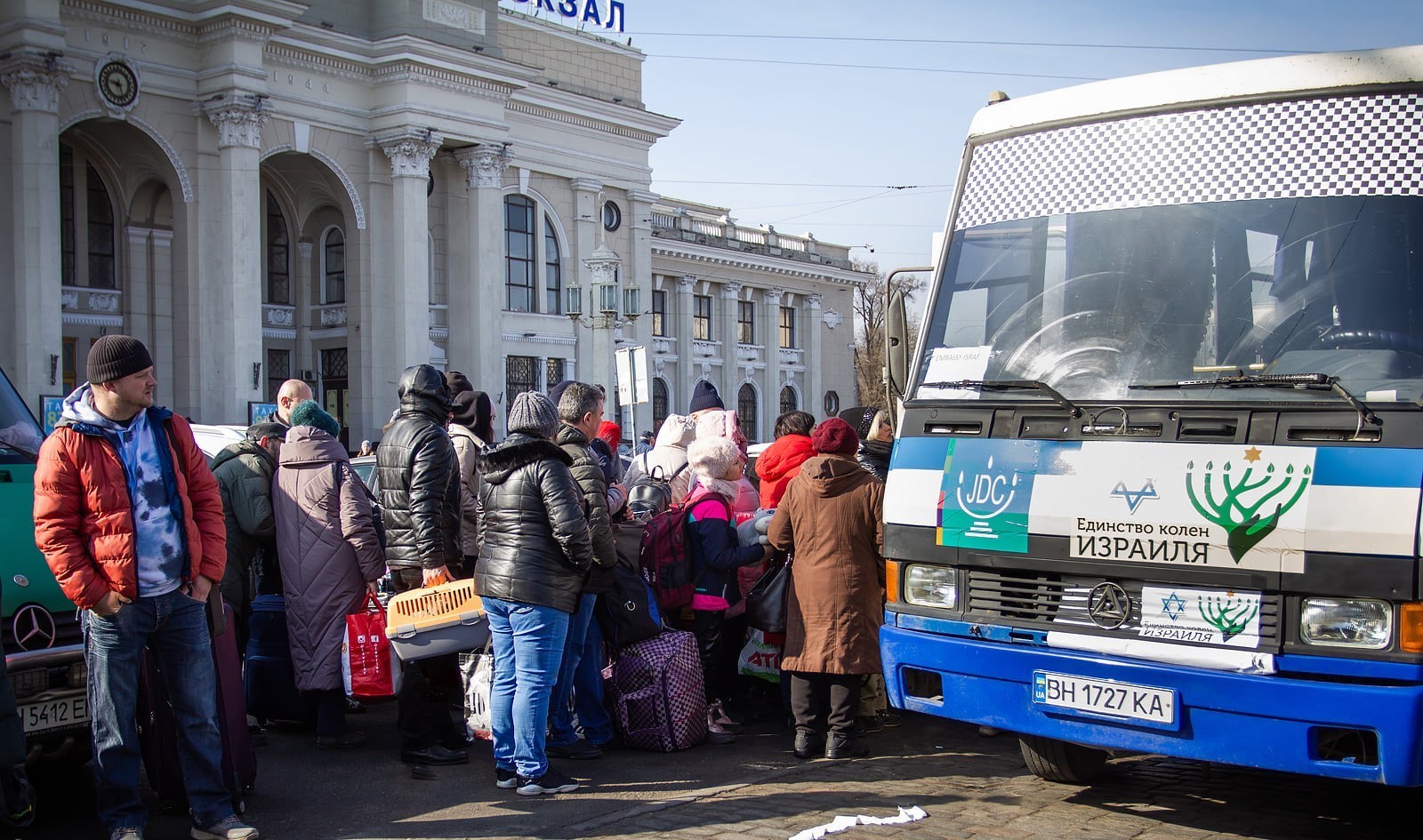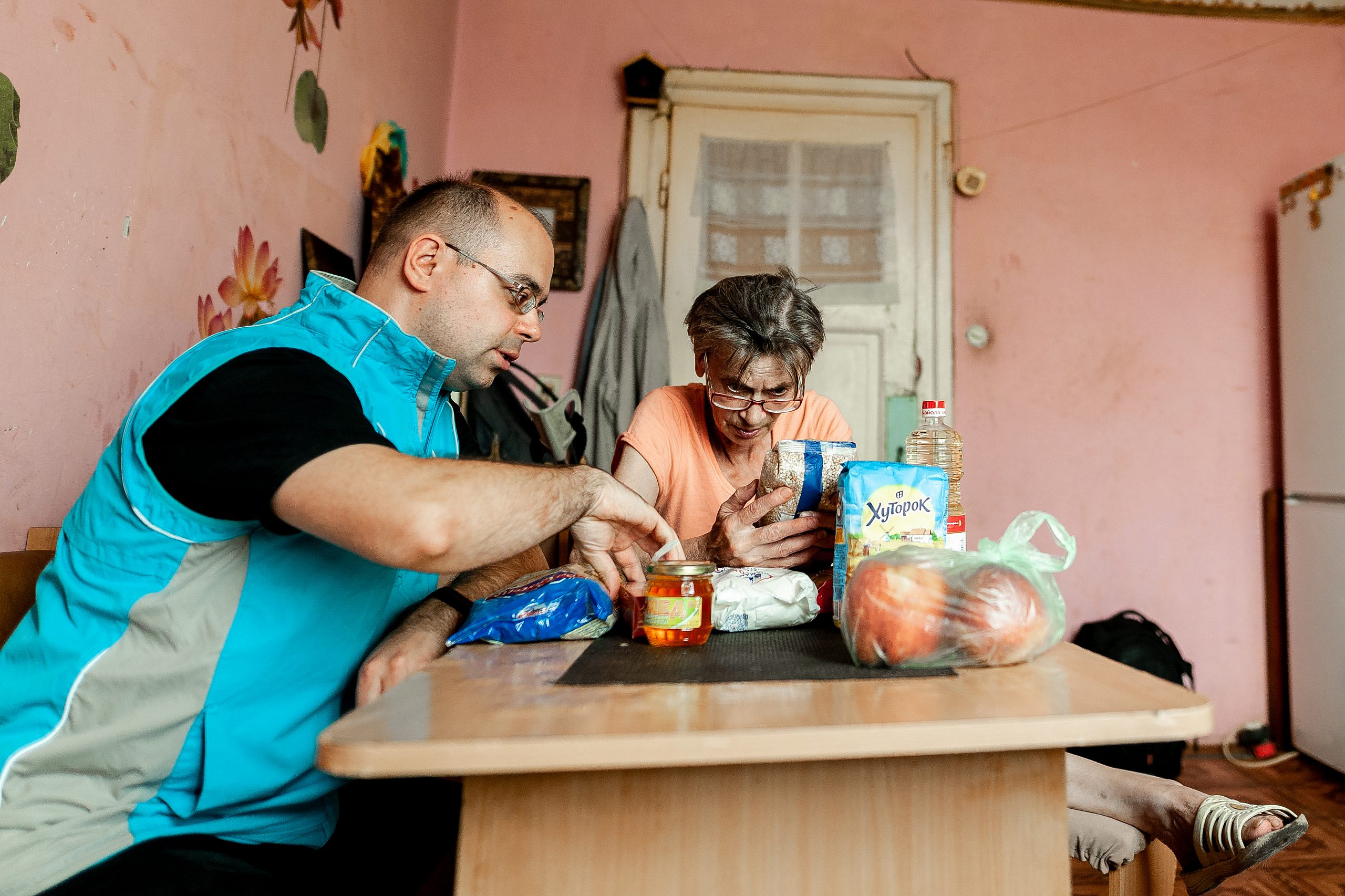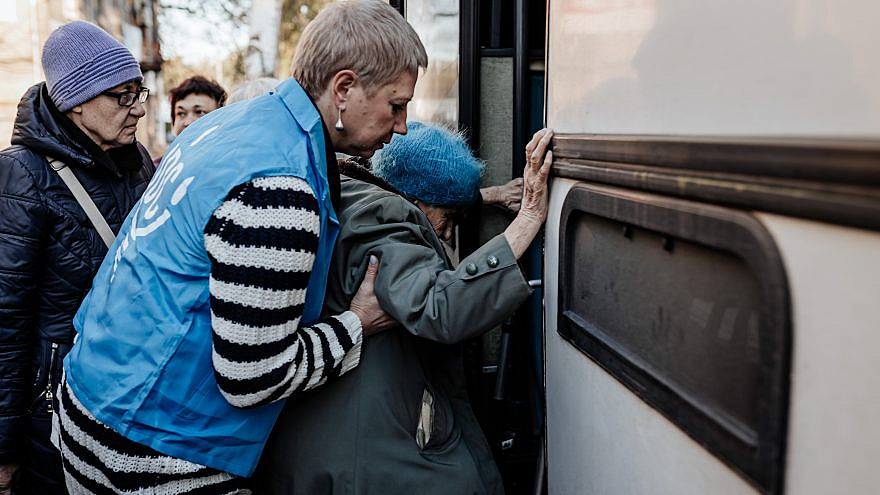PART ONE OF TWO STORIES
As the Russian invasion of Ukraine approaches its one-year anniversary on Friday, North American Jewish leaders at the forefront of humanitarian aid to Ukraine are appreciative of the ways Jews have pitched in.
Eric Fingerhut, president and CEO of the Jewish Federations of North America (JFNA), told JNS world Jewry has been generous in a “remarkable” fashion.
“The professionals on the ground, who’ve been doing this work, are unbelievable heroes,” he added. “Most of them are Ukrainian themselves or have family in Ukraine. This is deeply impacting them.”
Many of the aid workers on the ground are themselves displaced people. “They’re still going to work every day and helping others,” said Fingerhut. “We feel for them, and we want to help support them everywhere we can. We want them to know we’ll be with them every step of the way.”
JFNA has raised $85 million for humanitarian aid and relief for Ukrainians. It has focused on emergency operational costs; temporary housing; transportation for evacuations; security; humanitarian support; trauma and medical relief; and immigration and absorption in Israel.
That sum has helped as many as 500,000n people, including providing 700,000 meals and providing medical care to 130,000, according to JFNA. It has also helped train 4,000 medical and mental-health professionals, and delivered 120 volunteer placements to aid refugees across Europe.
“There’s an enormous sense of pride about what happened last year—not just the emergency funds raised, but the fact that this global infrastructure of Jewish humanitarian relief and rescue that has been built and sustained was in place to react,” said Fingerhut.
JFNA has distributed funds through its partners, including the American Jewish Joint Distribution Committee (JDC), the Jewish Agency for Israel and World ORT. More than 85 nonprofits operating in Ukraine and neighboring countries have also participated.

‘This is how we live’
Inna Vdovichenko, JDC’s representative in Odessa, told JNs that the words “perseverance and resilience” apply to Ukraine’s Jewish community. Specifically, she noted six Jewish community centers, Jewish Family Services, a volunteer corps and youth programs that have aided nearly 46,000 Jewish, elderly poor and 9,900 Holocaust survivors. There is also Hesed, a JDC network of 18 Jewish social-service providers, that had already been on the ground helping the elderly in Ukraine.
A wide spectrum of society, including Jewish teens and Hillel students, have been part of the relief effort. “All of them have become part of this dynamic response,” Vdovichenko said. “When everything started, we picked up roles that we had never performed before.”
The JDC, which has been active in Ukraine for three decades, has evacuated more than 13,000 Ukrainian Jews, including 167 medical evacuations of Holocaust survivors, in partnership with the Claims Conference, who fled towns and cities under fire. It organized caravans for the days-long journey to Moldova to bring them to safety, and it helped provide food, medical care, accommodations and mental-health services to them upon arrival. It also connects them with local Jewish communities and has transported Holocaust survivors to Germany for long-term nursing care.
The JDC Odessa team evacuated more than 9,000 Jews, largely to Romania and Moldova, according to Vdovichenko. The majority has remained in Ukraine.

“We went through very different stages of emotional stress and adaptation to the situation with empty shelves at our supermarkets, with a few pharmacies working in the city, with very bad power cuts, especially since mid-October, with people staying in cold and dark apartments,” she explained.
During the winter, JDC obtained and distributed flow batteries that help start gas heaters and generate electricity, along with warm blankets, fleece clothing, flashlights, wood, coal, canned and dehydrated foods, sleeping bags and electric bedding, and assistance for homecare workers.
Hesed centers and JDC-supported community service centers converted into warming centers with generators for those without access to heat or electricity.
Electricity can be lost for three to five days during power cuts, and many in Odessa are living without water as a result of non-functioning pump stations. Cell-phone service and internet access are luxuries.
“Any basic task in this life becomes a treasure hunt,” said Vdovichenko. “Because there is no Internet, you can’t withdraw cash from the ATM machine. Because the Internet terminals in the shops don’t work, you can’t pay. And you can’t pay in cash because there is no working ATM cash machine.”
Life happens “between sirens,” when everything closes down and the concept of time management has been turned on its ear.
“We know how to do everything now in two hours instead of one week,” she said. “This is how we live.”
A homecare worker cleans, buys groceries, pays utilities and buys medicine, “And suddenly there is no electricity,” said Vdovichenko. “These are my real heroes, in my opinion.” Still, relief efforts are underway 24 hours a day, seven days a week.
Near Vdovichenko’s office, a 92-year-old woman named Galena, who survived the evacuation during World War II, lives alone in a tiny, third-floor apartment. The JDC and its homecare workers are a critical lifeline to people like Galena. If a homecare worker wouldn’t come, “the world is broken for this person,” she said.
Despite unreliable Internet, JDC has held virtual Friday-night programming for Hesed clients. More than 150 Hillel students participate, helping to welcome in Shabbat. JDC has also distributed smartphones, with special key menus, to elderly people and trained them on how to participate in online programs.

‘Someone to rescue you’
On the one-year anniversary of the war, no end looms in sight. Vdovichenko and colleagues on the ground are in it for the long haul and preparing as best as they can for every eventuality.
“We really don’t know what is going to transpire in the coming year,” said Fingerhut. “You could have increased military conflict. It could stay about the same with intermittent escalations. Or it could begin to move towards resolution.”
In some of those events, tens of millions of dollars in additional aid would be needed, he said.
JFNA is convening regular meetings of its professionals, volunteer leaders and partners on the ground to monitor the developing situation and respond as needed. Core infrastructure for JFNA’s on-the-ground partners is fully funded for the coming year, said Fingerhut.
But that pace is hard to maintain as the conflict continues, particularly as it dominates the news less, and people are less compelled by images of refugees and the situation on the ground.
“It takes more effort to share with them what the ongoing costs and needs are,” said Fingerhut. When presented with compelling facts, “donors have been unbelievably generous.”
He thinks the events of the past year have been “a historic watershed” moment in the 4,000-year history of the Jewish people.
“When the history books are written of this era, it will be written that for the first time, when a war broke out in Europe, being Jewish didn’t mean you were the victim,” he said. “It meant that there was actually someone there to rescue and care for you.”


























